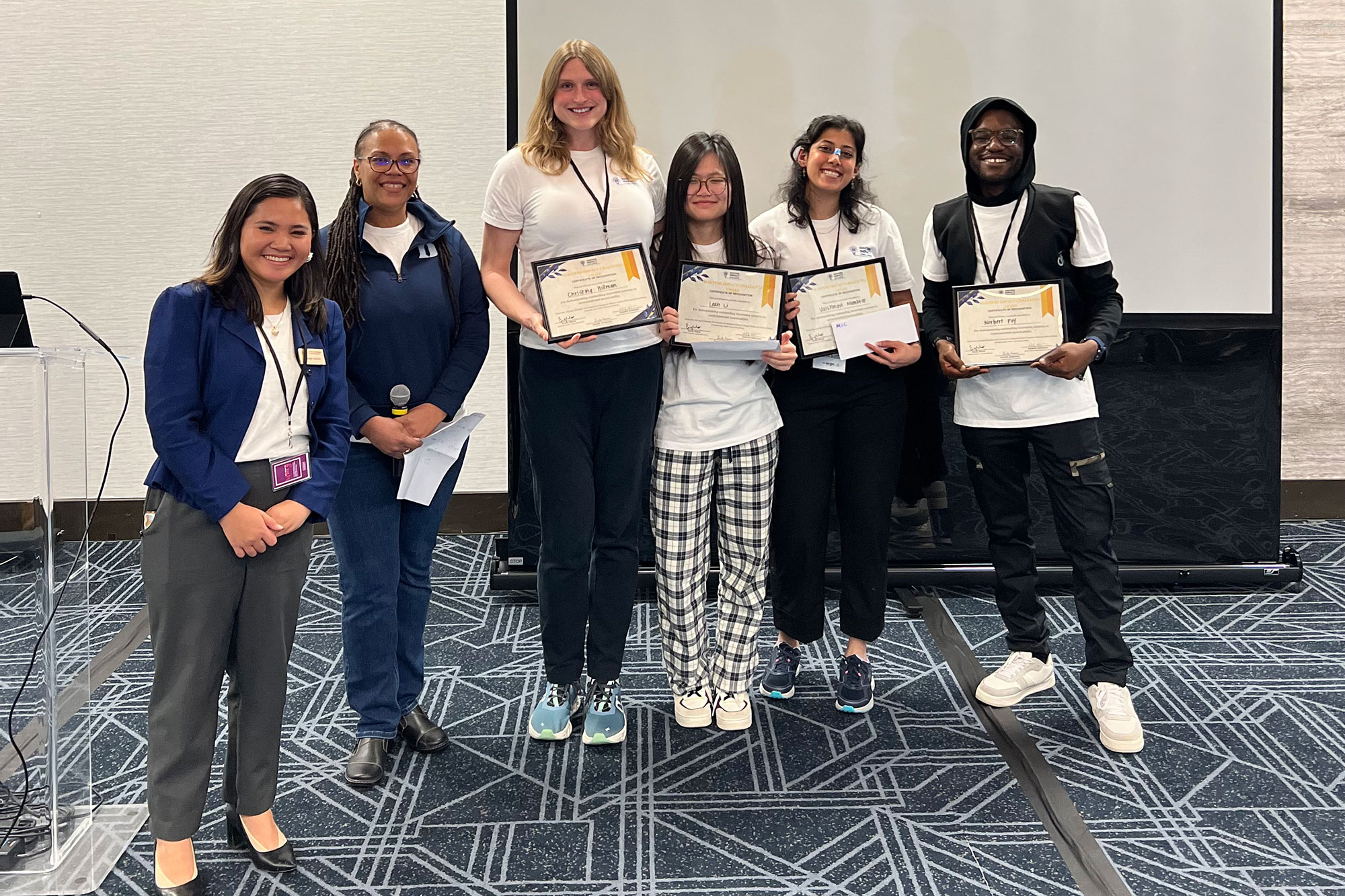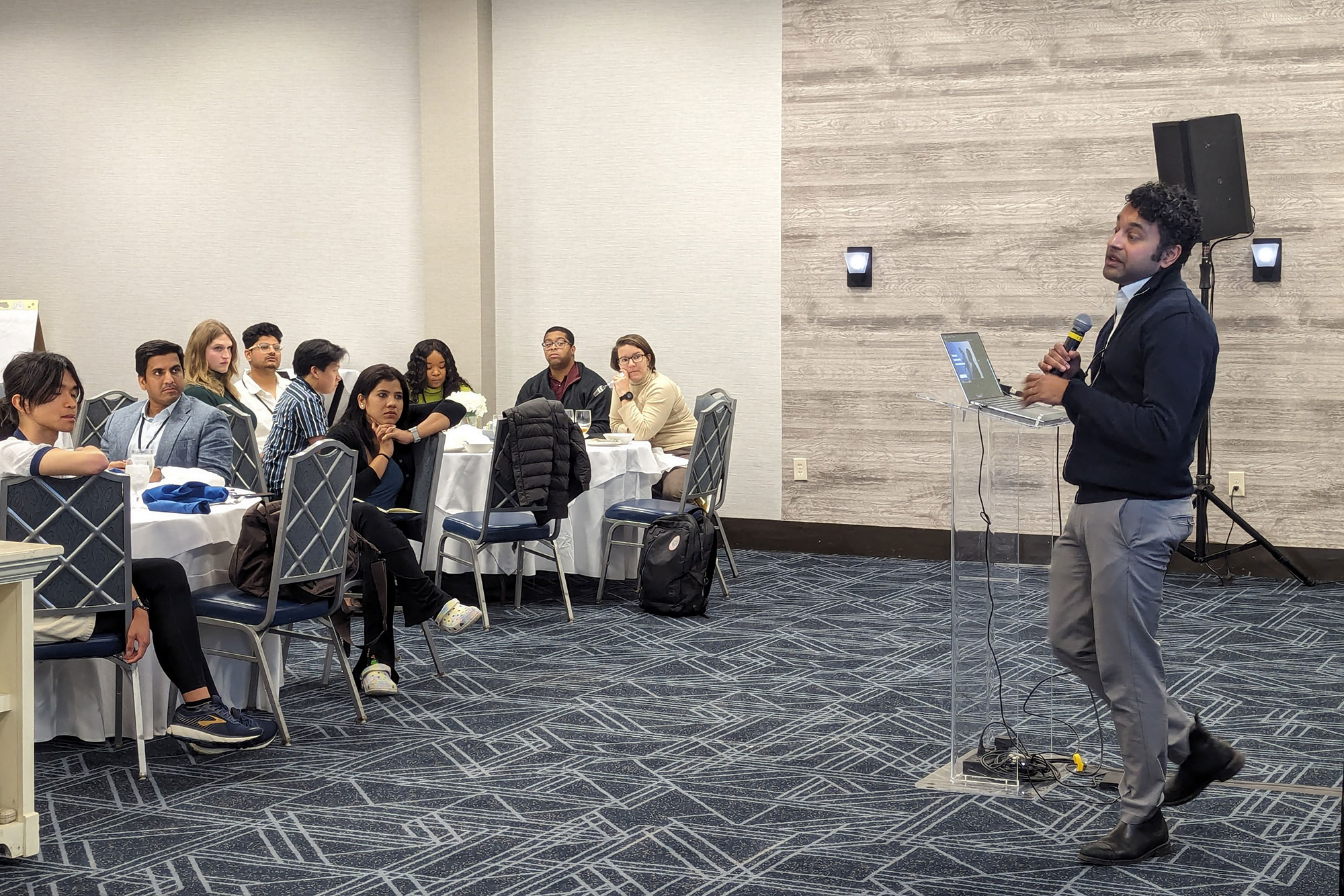Expanding the Duke Experience for Master’s Students
Workshop gave master’s students an unusual opportunity to make connections and do interdisciplinary problem solving


For three days the students, who didn’t know the assigned problem in advance, had a chance to brainstorm on an important issue, work with students from different disciplinary backgrounds and propose solutions. They also started creating a network of contacts at other schools.
As director for graduate studies in the University Program in Materials Sciences and Engineering, Stiff-Roberts works closely with master’s students.
“Our assumption is these students are very busy and are here for a very short period of time,” said Stiff-Roberts, Jeffrey N. Vinik Professor of Electrical and Computer Engineering. “They don’t have a lot of opportunities to engage in extra- or co-curricular activities that other students can. And that is an important part of the student experience.”
Students were divided into nine teams to develop and present a project. All were creative, Stiff-Roberts said; three were selected as winning presentations.
They were:
- The Green Devils: Christina Hilllman, Leah Li, Vaishnavi Nambiar and Norbert Foy won the Masters Impact Challenge Award for “Duke Carbon Food-Print,” a way to measure Duke students’ food consumption-related emissions and to encourage responsible behaviors in making food choices.
- The Green Barbies: Joan Kimani, Maria Silva, Wynona Curaming and Aulia Sarah received the Most Innovative Solution Award for a three-part plan that creates an interconnected fashion ecosystem for Duke students to mitigate negative impacts in their clothing choices. The plan includes a sustainable Duke clothing line, a quarterly Devil’s Thrifthouse where students can both donate and purchase used clothing, and fashion upcycling workshops.
- Our Team Name Was Stolen: Rahul Banthia, Everett Craddock, Catherine Wang and Gunel Aghakishiyeva won The People’s Choice Award for a plan to power the Wilson Recreation Center by installing new power-generating gym equipment and using the energy created by users. The team also proposes other solutions, including installing outdoor workout machines to generate power near the Al Buehler Trail.
Growth in Master’s Enrollment
In 2014, the Duke Graduate School admitted 875 students to master’s degree programs. A decade later, in 2024, it enrolled 1,824 new master’s students.
While the Graduate School and other schools have developed programs to try to meet their needs, these students face a number of challenges that are specific to master’s degree programs.
The proposals were judged by a team of Duke faculty, students and staff from Duke’s Sustainability Office.
A planning team of faculty, administrators and master’s students prepared the program challenge and related activities, which included speakers from Duke and the wider community.
One of the student organizers said he saw a lot of student engagement during the weekend.
“First and most important was that students wanted to break out of their shells and meet people outside their daily routine,” said Nashil Madhani, a Pratt School master’s student who served as a project associate. “That was the foremost reason why we got a great turnaround for the event.
“Secondly, since it was a master's or higher masters-level retreat, folks found it to be a great platform for networking. They loved knowing about each other's backgrounds and past experiences.”
Madhani also noted the moment where the business and nursing students exchanged thoughts on their different approaches. “It was amazing how folks tried to grasp different techniques of brainstorming from each other,” he said.
Stiff-Roberts said she enjoyed seeing how the networking popped up spontaneously.
“There were moments that just turned into impromptu sessions of getting to know each other,” she said. “Once I looked over and some were taking a break to play with thumbball toys and share questions.”
The workshop arose out of Stiff-Roberts’ Presidential Fellowship during the 2022-23 academic year. As part of the fellowship, she regularly met with President Vincent Price and sat in with deans and other leaders in units across the university. She was charged with developing a project that advanced Duke’s priorities but was also of personal interest to her.
“Our assumption is (master’s) students are very busy and are here for a very short period of time. They don’t have a lot of opportunities to engage in extra- or co-curricular activities that other students can. And that is an important part of the student experience.”
Adrienne Stiff-Roberts
“I’ve had a lot of exposure to master’s students through my role as director of graduate studies for materials science, and I’ve learned a lot about their interest in becoming involved more with the campus,” she said. “One thing I’ve heard is it’s hard for master’s students to get involved in events such as the Duke Climate Commitment. So, we had this strategic nexus of wanting to get the students more involved in the campus, building interdisciplinary opportunities for them, and allowing them to do something that is transformative on a university priority.”

